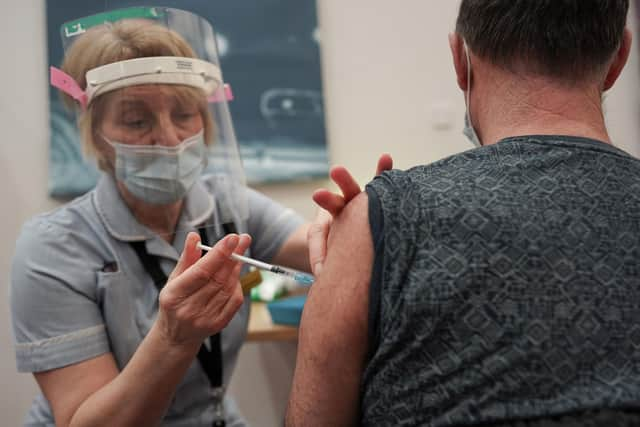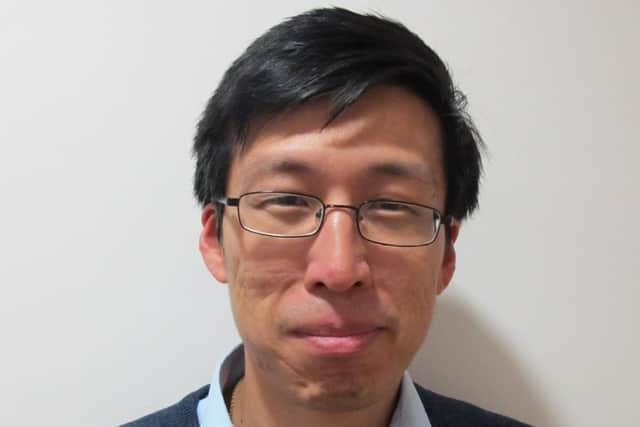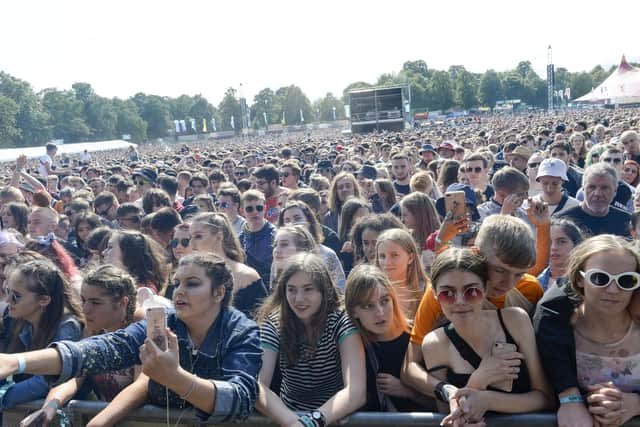Life 'will improve' in 2021, says Sheffield health expert – but there could be two more years of social distancing and this summer's festivals are in doubt
and live on Freeview channel 276
Dr Andrew Lee, a consultant for Public Health England who is also a reader of global public health at Sheffield University, said he felt ‘optimistic’ for the months to come but believed the next couple of weeks would be crucial in gauging whether the latest national lockdown is working.
"We're going through a tough period now with this current wave - the third wave - but I envisage as the year progresses the situation will improve,” said Dr Lee.
Advertisement
Hide AdAdvertisement
Hide AdHe described vaccines – which the Government hopes to administer to 14 million of the most at-risk people by mid-February before offering jabs to all over-18s by September – as a ‘game-changer’.


“Our NHS colleagues have really stepped up to the mark and they are vaccinating at pace. When you compare the situation now to even three months ago things felt a lot more bleak. We can actually act, proactively, to get ahead of this pandemic.”
But he added: “As we get more people immunised it makes it harder for the virus to spread. We will start to get fewer cases over time as vaccination bites. It hopefully means we won't be getting these huge epidemic waves. But even then we'll get the odd outbreak in the future.”
Dr Lee said opening up society again would be ‘a balance of how much risk you want to take’.
Advertisement
Hide AdAdvertisement
Hide Ad“In a sense that's really a political decision. We know that most of the people who are at the highest risk of dying are the elderly and people with severe long-term conditions. These are the groups we're targeting now. If the Government manages to get the top four priority groups immunised in the next couple of months that will start to erode the number of people dying.


"We know a lot infections primarily take place in working age adults, anybody from 18 to 60, but the risk of dying is lower in these age groups – so from the vaccinations we're doing now, we might not see an effect on the number of infections in the working age group for some months yet. At some point the Government will have to make a decision on when to open up the country. It will not be 'zero risk' - it's virtually impossible to get to zero risk.”
A good analogy, he said, could be drawn with driving a motor vehicle.
“It's dangerous, people die on the roads every year, but you still drive. You take precautions. The same applies to the pandemic.”
Advertisement
Hide AdAdvertisement
Hide AdMany of the public health measures adopted since last spring, such as the wearing of masks and keeping a two-metre distance from others, are ‘good’, said Dr Lee.


“We probably need to maintain them for some months or even the next year or two, and just see it as a means of protecting ourselves and others. When we look at history, and the SARS epidemic in 2002-3, many East Asian countries have changed the way they live. They practise a lot more distancing and wear face masks. They learned a new norm that protected them.”
However, he stopped short of predicting the wearing of masks could be permanent. “Never say never, but certainly in the short term it's a sensible thing to do.”
Mass gatherings – mostly cancelled worldwide in 2020 – may face hurdles even this summer, Dr Lee continued, putting music festivals like Sheffield’s Tramlines in doubt.
Advertisement
Hide AdAdvertisement
Hide Ad“I'm not convinced we will have enough population immunity by then. It remains to be seen how such a mass gathering can be made safe enough, because we know crowds are a good setting for infections to spread.”
But school closures may not be an extended state of affairs, he said.
"There's a lot of anxiety about it and it's completely understandable. But it's also important that schools are the last to close and the first to open. What we know from the evidence is that the risk of transmission in children remains low, especially in young children. I feel optimistic that we will be able to get schools functioning again fairly safely.”
The question of whether to maintain the home working policies adopted en masse by businesses during the pandemic ‘might be another discussion for society to have beyond an infection control point of view’, Dr Lee added.
Advertisement
Hide AdAdvertisement
Hide Ad“For some jobs, where it's feasible to do it, I think flexible working might have benefits to people.”
The most recent figures show Sheffield has an infection rate of less than 300 cases per 100,000 people. Dr Lee said the local picture has been ‘fairly static’ since November, ‘which is good news’.
“There are suggestions we might have turned a corner with this third wave. We will know in the next couple of weeks just how much lockdown is working. By and large most people are complying and doing the right thing. We've just got to keep encouraging people to keep the faith and stick with it. The sacrifice is worth it.”
He said many lessons could be learned from the Covid-19 pandemic.
Advertisement
Hide AdAdvertisement
Hide Ad“The first is how important it is to have good infection control measures in many settings - whether it's hospitals, schools, or care homes. Another is about the ongoing need to have strong surveillance systems to keep monitoring the threat of infections from around the world. It's also important we learn when such a threat emerges we need to act quickly to try and stamp it out. For me, the biggest lesson has been just how important public health is and local working partnerships are.”
